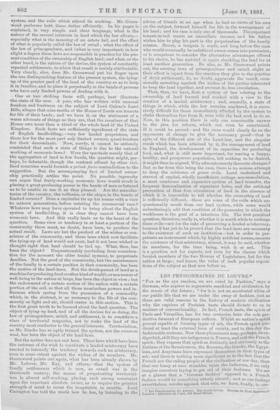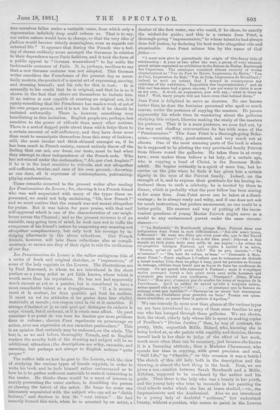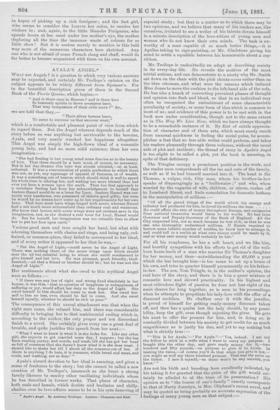LES PENSIONNAIRES DU LOUVRE.*
"FAR as the eye reaches, we are ruled by Fashion," says a German, who aspires to regenerate mankind and civilisation by the music of the future ; "for it is not an accidental whim of our public life that we are under the sway of fashion, just as there are valid reasons in the history of modern civilisation why the caprices of Parisian taste should dictate to us in matters of conventionality. In fact, French taste, the spirit of Paris and Versailles, has for two centuries been the sole pro- ductive ferment of European culture. Whilst no nation's spirit proved capable of forming types of art, the French spirit pro- duced at least the external form of society, and to this day the fashionable costume. Now these phenomena may, perhaps, be un- dignified, still they are indigenous in France, and suit the French spirit; they express that spirit as distinctly and obviously as the Italians of the Renaissance, the Romans, the Greeks, the Egypt- ians, and Assyrians have expressed themselves in their types of art ; and there is nothing more significant as to the facdtatliattiahe French are the ruling people of the civilisation .of our y, than that our fancy at once stumbles upon the ludicrous, if we only imagine ourselves trying to get rid of their fashions. We see at a glance that a 'German fashion ' opposed to a French fashion would be something utterly absurd ; and as our feeling,
nevertheless, revolts against that rule, we have, finally, to eon- _
• Les Pendonnafrom di' Louvre. Par Louis Leroy. Dessino do Paul Renenar& London larairie do l'Art, 134 Bond Street.
fees ourselves fallen under a veritable curse, from which only a regeneration infinitely deep could redeem us. That is to Bay, our entire nature would have to change, so that the very idea of fashion would become utterly meaningless, even as regards our external life." It appears that during the French war a feel- ing of shame suddenly arose amongst the Germans in relation to their dependence upon Paris fashions, and it took the form of a public appeal to "German womanhood" to lay aside the fashionable costumes of Paris. It is, perhaps, needless to say that a new German costume was not adopted. This German writer considers the Frenchman of the present day as essen- tially modern, the product of a special art of expressing, moving, and dressing himself ; and his rule for this is taste. It is assuredly to his credit that he is original, and that he is so is shown in the fact that others set themselves to imitate him. If no nation is now capable of creating an original art, it is surely something that the Frenchman has made a work of art of his own proper person, and it is not his fault if he should be imitated awkwardly. There is, however, something very humiliating in this imitation. English people are, perhaps, less sensitive to the power of ridicule than many other nations. There is a sort of dogged pride about them which helps them to a certain amount of self-sufficiency, and they have done more than most to emancipate themselves from this sway of fashion ; still, the most insular and thick-skinned amongst us, if he has been much in French society, cannot entirely throw off the feeling that our art, our dress, our taste, must be bad when they attempt to show independence of the French code. Who has not winced under the exclamation," Ah, que c'est Anglais!" if he is in the least sensitive to ridicule, and not altogether self-sufficient, insular, and sure of his own ground,—knowing, as one does, all it expresses of contemptuous, patronising, pitying condemnation.
These remarks occurred to the present writer after reading Les Pensionnaires du Louvre; for, showing it to a French friend who was well acquainted with many of the types there re- presented, we could not help exclaiming, "Oh, how French !" and we must confess that the remark was not meant altogether for praise. But it was taken for pure praise, with that naïf sell-approval which is one of the characteristics of our neigh- bours across the Channel ; and as the present reviewer is of an amiable, easy-going turn of mind, he took care not to ruffle the composure of his friend's nature by suggesting any meaning not altogether complimentary, but only took his revenge by in- dulging afterwards in the above reflections. Our French friends, however, will take these reflections 'also as compli- mentary, so secure are they of their right to rule the civilisation of our day.
Les Pensionnaires du Louvre is the rather ambiguous title of a series of fresh and original sketches, or "impressions," of some of the lady copyists in the Louvre. The illustrations are by Paul Renouard, to whom we are introduced in the short preface as a young artist as yet little known, whose talent is worth more than his reputation. He has not had apparently much succesS as yet as a painter, but is considered to have a most remarkable talent as a draughtsman. "Il a le motzve- ment et la couleur, lee deux qualit6s qui font les nmitres. Il saisit an vol lee attitudes et lea gostes dans leur r6alit6, materielle et morale ; son crayon rend In vie et is caractere. II attrape d'instinct cc je no sale quoi qui distiugue du eadavre le corps vivant, fut-il endormi, et il le rends sans effort. On pent examiner h cc point de vue tons lee dessins que none publious dans co volume ; chacun d'eux repr6sente un person nage en action, avec son expression et sou caracti..•re particuliers." This is an opinion that certainly may be endorsed, on the whole. The text is, as we said before, thoroughly French, and to English readers the novelty both of the drawing and subject will be an additional attraction; the descriptions are witty, sarcastic, and amusing, but perhaps not always to English notions "quite proper."
The author tells us how he goes to the Louvre, with the view of studying the various types of female copyists, in order to write his book, and he feels himself rather embarrassed as to how he is to gather sufficient materials to make it interesting to the reader. He thinks there would be a want of interest iu merely presenting the outer surface, in describing the person or classing the talent of the artist. He longs for some one intimately acquainted with the subject who can act as "diable boiteux," and disclose to him its "cot intitne." He had scarcely formed this wish, when he is accosted by an artist, a dauber of the first water, one who could, if he chose, be exactly the wished-for guide; and this is a certain Jean Potet, a. thorough-going " impressioniste," to whose talent he had always done full justice, by declaring his best works altogether vile ancl abominable. Jean Potet salutes him by the name of God father :—
" I must now give in parenthesis the origin of this fancy title of relationship : A year or two after the war, a group of very emanci- pated artists organised an exhibition in the Salons de Nader, Boulevari des Capueines. The catalogue consisted almost entirely of works characterised as ` Vue du Port de Havre, Impression du Matin,' ' Vuø do Ccei, Impression du Soir,' ' Vne do Cole, Impression du Brouillard indeed, to such an extent, that I named in consequence my criticism of the exhibition, 'Exposition des•Impressionistes ;' and as this mot has since had a great success, I am not sorry to claim it now as my own. A word, an expression, you will say,—what is there in that ? Well, many people will not leave oven that behind them."
Jean Potet is delighted to serve as cicerone. No one knows
better than he does the feminine personnel who spoil so much canvas, under the pretence of copying the masters. He passes apparently his whole time in wandering about the galleries studying this subject, likewise making the study of the masters his pretence. That it is a more pretence, we soon find out, by the racy and chaffing conversations he has with some of the " Pensionnaires." This jean Potet is a thorough-going Bohe- mian,—amusing, witty, good-natured, and very much out at elbows. One of the most amusing parts of the book is where he is supposed to be piloting the very provincial family Poivrot from Gisors round the galleries. He takes them in at every turn ; oven makes thorn believe a fat lady, of a certain age, who is copying a head of Christ, is the Baroness Roth-
schild. He begins evidently in a spirit of mere fun, but he carries on the joke when he finds it has given him a certain dignity in the eyes of the Poivrot family. Indeed,, on the strength of it, and to express their gratitude for his having in- troduced them to such a celebrity, he is invited by them to dinner, which is probably what the poor fellow has been aiming at for some time. Jean Potet never can be taken at a disad- vantage; he is always ready and witty, and if one does not ask for much instruction, but prefers amusement, no one could be a better guide. His answers and way of putting off the incon- venient questions of young Master Poivrot might serve as a
model to any embarrassed parent under the same circurn- stances :—
"'La Detheabee ' de Rembrandt plonge Mme. Poivrot dans une indignation dont Potet la sort difficilemoot.—' Est.olle assez jaune, Peffronted ! Et vous me dites quo c'est pour ells, quo le Roi David a commis un crime Oh! il en a 6t6 bien puni Jehovah a fait mourir en trois jours trois cent mule do see sujets.'—Le crime tin roi-propUte intrigue Fortune, qui rep6to it sati6t6 it ea ini)re, qu'est-co qu'il exalt fit? Di a un pee, maman.'—' Ta m'ennuies !' — Die, tout de memo, — Domande it Mon- sieur Potet.'—Potet explique it l'enfant qua Is vainqueur de Goliath
laiss6 tomber Uric dans on piege it lonp, pour lui prendre so femme de menage, celbbre dans Israel par sa Neon de faire lee eonfitures de coings. Co qui paratt tres rationnel it Fortund ; male ii s'explique memos pourquoi Tovah a fait perir trois cent mule hommes qui n'avaient pas touelie aux contitures, 'Pourquoi Dites, Feta!! Mon am, n'essayez pas de sender lee voles et moyens de la Providence. Qu'il to suffise de savoir qu'elle a toujours raison, mArne quand elle a tort.'—' Ah et pourquoi que la femme de menage nest pas habillea P'—' Parcequ'on se serait fait remarquer en Jude°, en s'habillant pour prendre on bain.' Toutes ces ques. tions oluoidees, on passe dans In galerie d'Apollon."
We can scarcely do more now than glance at the various types we are here introduced to ; many of them seem familiar to any one who has lounged through these galleries. We are shown, first, the stout, elderly lady whose life is spent in making copies of Prudhon's "Divine Justice ;" then, by way of contrast, the pretty, little, coquettish Mdlle. Bidard, who, knowing she is being looked at, as she paints with rapidity and decision, throws herself back in her chair to judge of the effect of her work, much more often than can be necessary, just because she knows
it is a becoming attitude ; then a Madame Chaumonot, who spends her time in copying, with great precision and zeal, "Still Life," by " Chardin ;" on this occasion it was a bottle The sketch of this old lady, both in the description and. the drawing, is almost the best thing in the book. Next, we are given a con.,raation between Sarah Bernhardt and a Mdlle.
Abb6ma, supposed to be overheard by the author and his guide. Then there is the lady who was a beauty in her youth, and the young lady who tries to reconcile in her painting the rival schools under which she has at times studied,—viz., the Impressionist° and the Academical. Also we are introduced to a young lady of doubtful "noblesse," but undoubted beauty, without a portion, who comes to paint in the Louvre in hopes of picking up a rich foreigner ; and the fast girl, who seems to consider the Louvre her salon, to receive her 'visitors in; and, again, to the little Blanche Perigueux, who spends hours at her easel under her mother's eye, the mother .deploring all the time the immense waste of colours for so little show l But it is useless merely to mention in this bald way more of the numerous characters here sketched. Any one who is not afraid of some French slang and chaff, would do Lay better to become acquainted with them on his own account.


































 Previous page
Previous page